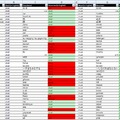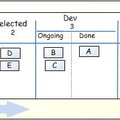1. Understand what is most important to work on.
2. Get more done by doing fewer things at once.
3. Understand your own capacity before you commit. Track where your time goes for a couple of weeks. How much time do you spend checking email, answering questions, going to meetings? Look for ways to reduce interruptions and reduce the biggest unproductive use of your time. (Taking breaks is not an unnecessary use of your time. We all know that we do better if we take a little breather from time to time.)
4. Review all the meeting you attend on a regular basis.
5. Make commitments based on your known capacity, rather than on an ideal 40 hour week.
6. Work in inch pebbles. Break down projects into tasks that you can complete in a day or two. When you do this, you can report tangible progress at least twice every week. You will become known as someone who gets work done.
7. Test as you go. Check in code at the very least once a day, and run all your tests for that piece of code each time you check in. That way, you will avoid having a false assessment of progress by deferring knowledge of problems until the (false) end of the task.
8. Peer review all fixes. A defect is a clue that the code is difficult to understand or poorly written. So you will avoid breaking something else by having another set of eyes look at the fix.
9. Write tests for the defect fix, and then write a half-dozen tests (at least) in the code around the defect. Defects tend to cluster, so you will be strengthening your code and your feedback system by writing additional tests.
10. Work at a sustainable pace. Tired people make mistakes and write or miss defects.





